Tahir Shah's Blog
July 14, 2014
The future of libraries, Paris Syndrome, and more…
 Many thanks to those of you were able to attend my Reddit AMA live. For those who were unable to attend, I’ll be sharing a selection of questions and answers over the next couple of weeks. To view the entire AMA, please click the above link.
Many thanks to those of you were able to attend my Reddit AMA live. For those who were unable to attend, I’ll be sharing a selection of questions and answers over the next couple of weeks. To view the entire AMA, please click the above link.
Q. Do you have any thoughts about the future of libraries to share?
A. On nights when I cannot sleep, i dream that I’m stepping into a massive, ancient enchanted library. Cobwebs everywhere. Candelabras, too. And that for me is the greatest human achievement — a massive ancient library. As for their future: I hope libraries will continue forever. i’m certainly collecting books with as much zeal as ever.
Q. From what I understand Paris syndrome seems to mostly affect Japanese visitors to Paris. Does this happen with other cultures and people visiting other cities often? Has there been enough research in this area to determine that?
A. Yes, it happens to other cities such as Jerusalem (hence JERUSALEM SYNDROME)… and it usually happens because of total overwhelming, coupled with an almost manic obsession with that place. I felt it in Jerusalem… people have held that city as a focal point for their entire lives and so it’s no great surprise they have such a heavy reaction.
And other nationalities (other than Japanese) do get PARIS SYNDROME, although the Japanese are the most obsessed with that city.
Q. What are the odds on someone with no experience, finding a treasure?
A. Very often experience is the one thing that holds people up from realising the goals of their dreams, and their greatest ambitions. Much better to believe in yourself and follow your gut.
Q. I’ve really enjoyed the unique qualities of each Secretum Mundi release whether it was the cool cover art, cartography, or overall design. I’m really excited about Roger Burrows Think 3D release and I’ve been wondering about patterns and Geometry and levels of organization available in your works. It seems like they have many dimensions available. Is this something you have been trying to help people see with the “golden head” search (triangulations?). I’ve wondered about this and the publishing name, Secretum Mundi…
A. Secretum Mundi… the ‘Secret World’. I chose it as a name because I love the idea that there are worlds within our own world. We can’t see them. But they are there. Just as no one had actually seen individual cells until relatively recently (through a microscope) I am sure there’s far more to see. But it’s a question of learning to ‘see’ in new ways. I am preoccupied with the idea that society un-educates us in the education system. It teaches us to think like robots. But, as you know, robots don’t really think. They just regurgitate.
Roger Burrows’s Think 3D amazed me. I love the way he charts patterns through geometry. I regard his work as some of the most important and interesting of its kind being done today.
July 9, 2014
Photojournalism, and which type of equipment I use
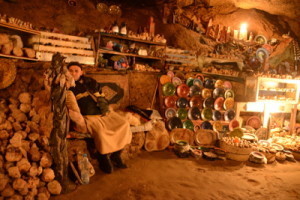 Many thanks to those of you were able to attend my Reddit AMA live. For those who were unable to attend, I’ll be sharing a selection of questions and answers over the next couple of weeks. To view the entire AMA, please click the above link.
Many thanks to those of you were able to attend my Reddit AMA live. For those who were unable to attend, I’ll be sharing a selection of questions and answers over the next couple of weeks. To view the entire AMA, please click the above link.
Q. Any advice for a photojournalist student whose dream is to work for National Geographic?
A. Develop a body of work that is original. Never ever ever follow the pack. And remember that most people in their teens and early twenties (not sure how old you are) don’t go out and do stuff. They often sit about, waiting for someone to give them an idea, a ticket, a job. Well that’s wrong – -you have to get out and set yourself goals, challenges, find work and then sell it. And don’t expect Nat Geo to take you on round one… spiral upwards towards it. You WILL get there. Don’t listen to anyone who holds you back or suggests you can’t. Because you CAN!
Q. What kind of camera and equipment do you have in your arsenal of shooting? Just wondering because all Nat Geo movies are always beautiful shot and I want to know what it takes!
A. Until very recently we were shooting on Ariflex Super-16. Film… and doing some video. I LOVE film because as a presenter it gets you concentrated because it’s so expensive, and because it looks so wonderful. With video — most people these days are using SLF cameras or high end video cameras (like RED). We’ve just shot something on a Nikon D800. The great thing is that you can change the lenses, and they are of such high optical quality.
July 7, 2014
Top Tips for Interrailing Around Europe
 Get seat reservations. They don’t cost more than 3 or 4 Euros, and they save you the misery of having to stand in the corridor when a train is full.
Get seat reservations. They don’t cost more than 3 or 4 Euros, and they save you the misery of having to stand in the corridor when a train is full.
Buy food in a supermarket before going to the train station. Some stations have supermarkets. Never buy food on trains unless you have to.
Check www.seat61.com which is the greatest train web site of all.
Download the Interrail App, which is great because you can check train times off-line.
Don’t plan more than a day in advance because you’ll have a far better zigzag experience.
Travel extra light. When you’ve packed your bag, take out half the stuff and leave it at home.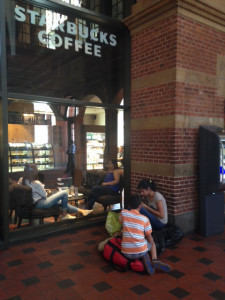
If arriving somewhere at night, try to book a cheap hotel online before reaching the destination – as you’ll probably get a better deal.
Good places to pick up free WiFi signals are: Starbucks, McDonalds and Burger King. We never actually go inside them – but stand outside, fishing for a signal. Best of all, most places don’t turn off the routers when they’re closed.
Track down laundromats and drop off clothes as soon as you get to a city. The less clothes you take with you, the less stuff you’ll have to wash. It’s a great idea to have one good outfit for when you want to live it up.
Keep a bag of basic food so you always have breakfast cereal and snacks – a great way of avoiding ultra expensive hotel breakfasts.
July 3, 2014
My thoughts on jinn, observation, imagination, and dreams
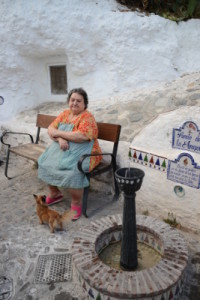 Many thanks to those of you were able to attend my Reddit AMA live. For those who were unable to attend, I’ll be sharing a selection of questions and answers over the next couple of weeks. To view the entire AMA, please click the above link.
Many thanks to those of you were able to attend my Reddit AMA live. For those who were unable to attend, I’ll be sharing a selection of questions and answers over the next couple of weeks. To view the entire AMA, please click the above link.
Q. Let’s say you pissed off a Jinn. Big-time. He says: “I intend to punish you. But before I do, I’ll let you choose who or what you are going to be next. You can be anyone or anything except you.” Who or what would you choose to be?
A. I’d want to be transformed as a man on a journey with a magic ring on his finger. The ring can’t create wealth of any kind, but can lead to fabulous adventure.
Q. Are there any things one can do by one self that would help one to concentrate and observe better or can that only be helped with special training?
A. I think it’s a question of learning to focus in a new way. I’m so against the kind of instruction we all had in school because I think it kills the default settings in us.
I often sit in a cafe — say here in India — and will not allow myself to get up until I have appreciated something obvious in a new way. It’s a kind of game. It takes retuning, but it’s surprisingly easy.
Q. How is one to tell if one’s imagination is not running away with one?
A. I love imagination and attuning myself to it. Again, listen to your gut and don’t allow your programmed mind to take control. Look for the default setting within you.
Q. When you are engulfed in one of your projects, do you also dream about it?… What i mean is, do dreams, sometimes, show you solutions to problems at hand?
A. I am obsessive and it’s a mixed blessing. It gives me huge energy and commitment. But, at the same time, it means I’m a bit of a nightmare to live with. Because when I’m working on something, that project is all I can think about. Yes, I certainly dream of what I’m working on. And, I try to go on long walks and allow my subconscious mind to solve the problems and conundrums that always surface. The subconscious is the greatest problem-solving mechanism we have. But we seem to forget that it’s there, waiting for us to ask its help.
July 1, 2014
My Top Ten Favourite Films
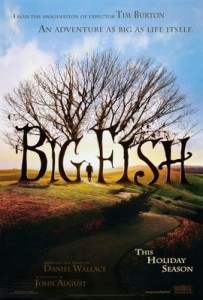 In response to a recent request, here is a list of my top ten favourite films:
In response to a recent request, here is a list of my top ten favourite films:
1. Big Fish
2. Cinema Paradiso
3. Fitzcarraldo
4. The Red Violin
5. The Grand Budapest Hotel
6. Wag the Dog
7. Apocalypse Now
8. Catch Me if You Can
9. Amelie
10. Being There
June 30, 2014
My most loved travel destination, and answers to other questions
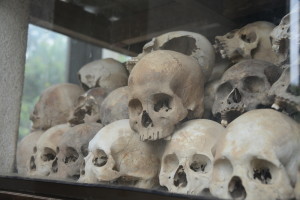 Many thanks to those of you were able to attend my Reddit AMA live. For those who were unable to attend, I’ll be sharing a selection of questions and answers over the next couple of weeks. To view the entire AMA, please click the above link.
Many thanks to those of you were able to attend my Reddit AMA live. For those who were unable to attend, I’ll be sharing a selection of questions and answers over the next couple of weeks. To view the entire AMA, please click the above link.
Q. I believe you spent time in Japan. Can you tell us about your time there?
A. Japan is a magical Twilight Zone all of its own. I lived there for a year and was completely broke – twenty years ago. I only survived by stealing ceremonial cabbages from Ueno Park and taking them back to my friend Robert Twigger’s apartment — I was living on his floor — and cooking them into very thin soup.
Q. Could you comment on Zigzag travel?
A. I just wrote on my Facebook page this:
“If there’s a key-word to my life it’s ZIGZAG… because in life the best roads are never straight.”
Zigzag travel is what opens doors. And takes you on adventure. Never plan too much. Go without maps and without a phone, and listen to your gut… because I’s trying to tell you something.
Q. In “In Arabian Nights” is the idea that the wise person knows they are a fool. Can you comment on “knowing you are a fool” in relation to successful travel or living in a new country?
A. I have heard it said that in order to know a place or write about it — you must write about it immediately or not until after thirty years. Living in Morocco I have found that with each passing day a little more of the magic is revealed. But, at the same time, I have also found myself increasingly confused… and in awe. I think the condition of a fool, however wise, is a delight. And were we all wise, we should all wish to be fools.
Q. If you haven’t already answered this, what lost cities do you want to find?
A. Paititi is still out there.
Go and look for it!
Madre de Dios jungle.
Take vaseline for your feet. because all the skin’s going to come off when you’re in the river.
Q. How do you overcome despair in journey, or for that matter, the despair of your crew?
A. Hot food. And lots of it. That’s the biggest builder of morale. That, and gut-rot alcohol. And to lead from the front — never expecting the men to do anything you wouldn’t do yourself. The only time I go last is to eat. I never eat until the men have all eaten. It’s an easy demonstration of my respect for them.
Q. Have ever had to deal with mutiny? and whats the best way to deal with it?
A. I was in the Madre de Dios jungle for 16 weeks. No skin on our feet. All the men had had dengue, as well as I. The rain lashed down relentlessly. Cold rain. The food stores were rotting. There was no hope. And, yes, at this point, the porters started to mutiny. I had to get them back on track and it wasn’t easy. I did it with a mixture of coercion, rest, singing, humour, and spiced hot food. (The only way to eat the food by that point was to spice it).
Q. Have you ever undertaken any epic walks, (500 miles or more) would you, and where would you?
A. I want to, I want to, I want to!
My old friend and in my ways my mentor, Wilfred Thesiger, used to tell me that walking was the only way to travel… he said that if you walked the chance of missing anything interesting — people, animals or things, was immensely reduced.
I dream of walking or cycling (Thesiger frowned on bicycles because they were too fast), across Africa, or Cairo to cape.
I must do it. I WILL do it.
Q. In all your travels/adventures, have you ever visited a place where the inhabitants live in harmony with their surroundings? Thank you for this opportunity and all the wonderful books (each one an adventure).
A. I think that to answer the question we have to consider, or reconsider, the idea of harmony and what it is. What you or I regard as harmony isn’t necessarily what others take it to be.
I’m actually in India right now — in Mumbai — and I’d tell you (my opinion) that there’s nothing harmonious about this city. it’s wonderful but it’s mad mayhem, a wild rumpus of a place. But to my wife , Rachana, and to millions of others here, it’s total 24 carat harmony.
Q. Of all the places you’ve been and things you’ve seen, what place did you love the most and hope to see again (to maybe move one day or bring the family with you)? What’s been the most dangerous location, a place you’d never want to go again under any circumstances?
A. Most dangerous: Afghanistan. At one point during filming of our Afghan lost treasure documentary, the director (David Flamholc) was shot in the thigh. And that was after getting out of a torture jail.
Most loved: wow, such a hard one. I try and avoid questions like that because I love so many places, and going back to loved places time and again. It depends on my mood. And right now I’d say the Rift Valley in Kenya. I love it, i dream of it, I worship it.
And my favourite thing in all the world is to be in Africa when the first rain comes, and to smell the earth as it rains.
That, my friends, is magic.
June 27, 2014
An Incident on the Border
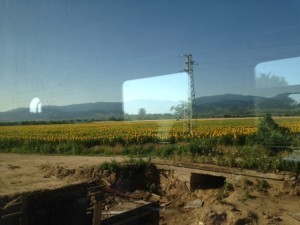 Sofia’s railway station must once have made a great many party men proud.
Sofia’s railway station must once have made a great many party men proud.
Built in the days when concrete was all the rage, its lines may be strewn with graffiti now, but they’re still razor sharp. These days it’s all but derelict – a tired vestige of cultural embarrassment, waiting for the wrecking ball.
We took the morning slow train towards Bucharest, arcing through countryside more lovely than any I can remember.
Pine forests with green young leaves, and streams swollen with late spring rain, ramshackle farmsteads, their terracotta roofs all forlorn and caved in. Sunflowers stretching from one horizon to the next, a million heads turning slowly as midday looms.
We feasted on sausage and on black bread, and listened to the old laughing men who came and went – from one unknown stop to the next.
And then, all of a sudden, the carriage slowed at an empty station.
A guard from the Bulgarian border force climbed up energetically, looked at our passports, grabbed them, and vanished across the tracks. He was gone a long while, as we wondered anxiously what was going on.
Forty minutes passed.
Just before the train moved away, the border guard returned. He ordered us to take our luggage off the train, and to follow him back across the tracks.
We did so, and found ourselves at a police car.
‘Get in!’
‘Is there a problem?’ I asked.
The guard didn’t answer. He drove very fast along a dusty piste, emerging at the actual border, fifteen minutes later.
Before we knew it, we had been taken into a small interrogation room.
A map of Bulgaria was glued unevenly to the back wall. A battered desk and a pair of cheap wooden chairs. An official with a cigarette clenched in front teeth. A sense of doom, as though many lives had been wasted answering inane questions within the yellowed walls.
The border guard from the train whispered into his superior’s ear. Our passports were brought out live evidence, and were inspected.
We were photographed – mug-shot style. Ariane, Timur and me.
Only then did the chief jab an index finger at a big visa stamp in each of our passports.
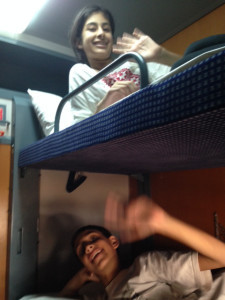 ‘This one!’ he yelled boisterously.
‘This one!’ he yelled boisterously.
‘Which?’
‘This green one.’
Squinting, I leaned forward.
‘That’s a Cambodian visa,’ I said. ‘We all have them.’
The official mumbled something indistinct into his deputy’s ear, then looked at me hard.
‘When you go to Cambodia?’
‘Last summer.’
‘Why you go there?’
‘We visited Angkor Wat.’
‘Ank…?’
‘Angkor.’
‘Cambodia… it is… dangerous!’
I shook my head.
‘Good people,’ I said. ‘But they had a nasty war.’
‘War,’ the chief echoed morosely. ‘War. Bad. War Very bad.’
I poked a finger towards my passport.
‘Cambodia. No Problem.’ I said.
The chief stubbed out his cigarette and lit another, all in one movement.
‘Cambodia problem. Big problem,’ he corrected.
‘Problem to Bulgaria?’
‘Immigrant problem.’
‘Oh,’ I said. ‘But we’re not actually from Cambodia. We just went there.’
The chief frowned. He rubbed a set of nicotine-stained fingers down over his mouth.
‘You go back… to Cambodia?’
‘I hope so. But not right now. First we are going to Bucharest.’
Another hour passed, in which I revealed all I knew about Cambodia – which isn’t very much at all. The visas were photographed and photocopied, and our mug-shots were taken once again – for good measure.
Then we were driven in an armoured Land Rover at high speed across the Friendship Bridge, to the Romanian side of the border.
Once our passports had been inspected once again, we were informed that we were free to go.
‘Will you take us back to the train?’ I asked, limply.
The guards cackled in unison.
Then they shook their heads very hard.
One of them pointed to a red sign on the horizon.
‘Petrol,’ he said.
So, trudging and moaning, we lugged our bags to the distant petrol station, and, miraculously, found a cab. He took us to Giurgiu, the first railway station in Romania.
We were hot and bothered, and wondered if we would ever get a train.
At the single platform, a goods’ train was being checked over.
I asked the station manager if there were ever trains to Bucharest. He rolled his eyes, and led us across the tracks again, behind the goods’ wagons.
And there, like some apparition conjured from Arabian Nights, our original train was waiting.
June 26, 2014
Sea Trunks and Sausages
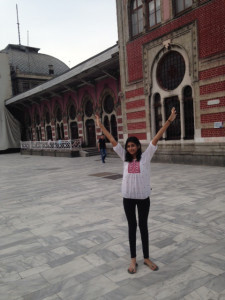 Istanbul’s Sirkeci Station could not be more atmospheric if it tried.
Istanbul’s Sirkeci Station could not be more atmospheric if it tried.
Close your eyes, and you can smell the scent of billowing coal smoke, and hear the roar of the Orient Express charging in like an iron stallion from western climes. There’s still such a tremendous sense of anticipation there, the rawest thrill of travel.
But, with modern Istanbul raging all around it, Sirkeci Station is a backwater these days, one that flipped from grandeur to rack and ruin without anything in between. Patronised by a great many ginger tomcats, it’s yet another relic of the city’s past – a treasure trove of finished journeys and of memories.
We turned up early for the train to Bulgaria, only to be told by the glum station manager that trains were few and far between. In fact, he hinted darkly, there hadn’t been one in months.
‘They will close us down,’ he exclaimed in a voice haunted by melancholy, ‘it’s only a question of when.’
‘I’m sure they’ll see sense,’ I replied, optimistically.
The manager’s expression soured.
‘They will tear it to pieces, brick by brick,’ he said.
‘What will you do?’
‘I’ll have no choice but to take the cats and go.’
So our great European train journey began with a night bus instead.
Our fellow passengers included a pair of English girls, both with hair dyed electric blue. An octogenarian lady from Melbourne, dragging behind her a battered sea trunk weighing as much as a bull elephant calf. And a slim elderly Bulgarian man named Sascha. He had a pencil-line moustache, and was dressed from head to toe in a cowboy costume. It began in a ten-gallon hat and ended in boots fitted with spurs.
On the dot of ten, the bus ground out into the gridlock.
Endless shopping malls followed, and high-end car dealerships, glass office complexes and giant plasma screens – all of it suggesting the newest incarnation of an ancient city.
After jerking forward bumper-to-bumper for too long, we slipped onto a freeway and the bus slalomed west. Just as we seemed to be making real progress, the driver pulled in at an abhorrent truck stop.
There were cigarettes to be smoked and much apple tea to be drunk.
The girls with blue hair joined him.
And, while they did so, the woman with the ship’s trunk told me about her last trip across the approaching border.
‘They set their dogs on me,’ she said in an absent voice.
‘Who did?’
‘The Turkish guards.’
‘Why?’
‘Because they didn’t like my skirt.’
‘Huh?’
‘They thought it too short.’
‘When was that?’
‘Sixty-four. Might have been sixty-three.’
‘Did they bite?’
‘The guards?’
‘No, the dogs,’ I said.
The woman pressed a hand to her hair. It was silver-white.
‘No, no,’ they didn’t,’ she replied. ‘They just licked my legs. They wouldn’t stop.’
‘That was luck. You know, they may have attacked.’
The woman from Melbourne sniffed, her mind replaying the event.
‘It wasn’t chance,’ she said.
‘I don’t understand.’
‘Well, a friend of mine used to cross the border often,’ she said. ‘He’d told me a secret.
‘A secret?’
‘A secret to keep off the guard dogs.’
‘What is it.’
‘Promise not to tell?’
‘I crossed my heart and looked meek.
‘Sausages,’ the Australian woman said. ‘You rub your legs sausages.’
‘Did it work?’
‘Like a dream.’
A mile from the border, we were deposited in a little railway waiting room.
It was three in the morning, and even the blue-haired students were losing their teenage gusto. We sat there for an hour or so, each of us thinking of sleep, waiting for a replacement bus to arrive from Sofia, and scoop us up.
The woman from Melbourne opened up her ship’s trunk.
It seemed to contain a full set of leatherbound encyclopedias and a great deal of Turkish Delight. Removing a soggy packet wrapped in newspaper, she slunk into a back room for a while, then emerged smelling of sausages.
She gave me a wink.
The next thing we knew, we were in No Man’s Lane, our luggage being pored over by a guard with a flashlight.
There wasn’t a dog in sight.
A little later, after much checking of papers, sideways looks, and cunning questioning (such as: ‘Why do you travel with so many sausages, Madame?’), our group was waved through.
We trouped back onto the bus, and were driven a short distance to a station, where we were bundled aboard a train.
Then another.
By late morning, we reached the Sofia Railway Station, a great hulking monstrosity conjured from the grimmest concrete.
As so often happens, I felt a camaraderie with the others – as though friendships had been forged through adversity.
We sauntered over to the information counter to ask directions.
A few minutes later we went back to say our goodbyes, and to pledge an oath of friendship – the friendship of travellers.
But the cowboy, the blue-haired girls, and the woman with sausage-smelling legs, had all disappeared.
Where the great sea trunk had been standing was a one-eyed mongrel without a tail.
He was licking the ground, a glint of delight in his eye.
June 25, 2014
My thoughts on writing and time management
Many thanks to those of you were able to attend my Reddit AMA live. For those who were unable to attend, I’ll be sharing a selection of questions and answers over the next couple of weeks. To view the entire AMA, please click the above link.
Q. How do you get started with writing a book?
A. I come from a family in which everyone was writing books. And I grew up knowing a lot of successful writers. And that was like a magic wand in that it showed me that there was nothing special in writing books, no mystery, just grind. Do the grind and the book gets written. Write 3000 words a day, every day, for 30 days and you’ll have a 300-page book. It’s a fail-proof method. Plan it though.
To answer your question – I went on a load of random travels and then sewed them later into a rather weak narrative, when I was 22 years old. It’s called BEYOND THE DEVIL’S TEETH. I’m not so pleased with it, but I am pleased that I did it — as it led to other stuff.
Q. I am finding it difficult to market this work and write new stuff. How do you juggle your time – you are so prolific?
A. Time juggling: I find that I’m good at doing total-focus, a kind of deep immersion. That’s how I blot everything else out and that works for me. But at the same time I drown everyday in emails and stuff. There’s too much of it and it’s crazy. We all drown in it — especially because email is so immediate. I just counted my outgoing emails today. i have already written 85 outgoing today. Some of them are long; others shorter. And I’ve had 290 incoming. I miss letters and the days when time was less compressed.
June 24, 2014
My thoughts on enthusiasm
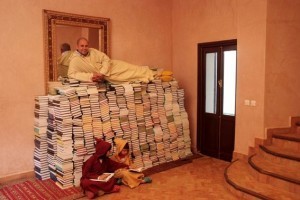 Many thanks to those of you were able to attend my Reddit AMA live. For those who were unable to attend, I’ll be sharing a selection of questions and answers over the next few weeks. To view the entire AMA, please click the above link.
Many thanks to those of you were able to attend my Reddit AMA live. For those who were unable to attend, I’ll be sharing a selection of questions and answers over the next few weeks. To view the entire AMA, please click the above link.
Q. What I love about your writing is, how you are able to describe a scene or scenario so vividly. My questions are, what are the criteria when you are choosing your crew for an adventurous exploration journey? and, are you going to embark on another journey like “In Search Of King Solomon’s Mines” ?
A. It’s so simple. I look for one thing. One quality.
ENTHUSIASM.
That’s all I want from anyone. If they can’t survive in the jungle, I’ll teach them. Or will show them how to rope climb, or how to do anything else… but I want people who will beam with laughter when the skin’s come off their feet and they have dengue fever… again.
Q. I have found the enthusiasm for life that you express in your books to be quite infectious. Is it something that just comes naturally to you, or are there any tricks or techniques that you use to maintain it?
A. I am enthusiastic. Yes, yes, yes. And, yes, yes, yes… I sometimes get really depressed… mostly when I hit a mountain and can’t seem to get over it. But in my own way I’ve learned to tunnel through.
When I was a child I had a book called THE TRAIN TO SPAIN. It’s for kids and I think it’s out of print (alas)… and that book taught me that there’s always a way forward: and if there is a way forward, there’s a smile on my face. To find the way forward you may have to think in new ways.



